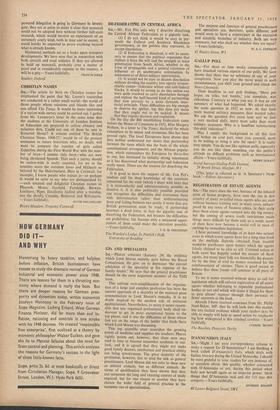DE-FEDERATING IN CENTRAL AFRICA SIR,—Mr. Fox Pitt asks why I
describe dissolving the Central African Federation as a gigantic task. . (1) I do not think it would be easy to per- suade the Federal and Southern Rhodesian governments, or the publics they represent, to accept dissolution.
(2) If Federation is dissolved, it will be neces- sary to ensure that the political organisms that replace it have the will and the strength to resist penetration from South Africa, whether in the form of propaganda and a general extension of influence or of unobtrusive colonisation by settlement or of direct military intervention.
(3) It would not be easy to discuss dissolution without dividing the country into openly irrecon- cilable camps—federalist whites and anti-federal blacks. It would be wrong to do this unless one were quite resolved to carry dissolution through and replace the half-hearted kind of partnership that now prevails by a more dynamic inter- racial principle. These difficulties are big enough to deserve my epithet, but this does ndt mean that they ought not to be tackled. It means that they require decision and resolution.
On the day the Bill establishing Federation came before the House of Commons in 1952, Miss Margery Perham, in a letter to The Times, declared the whole conception to be unjust and erroneous. She has been proved right. The local Europeans have shown that they neither understand nor desire that partnership between the races which was the basis of the whole constitutional arrangement; and the African popula- tion, which outnumbers the European by thirty-five to one, has increased its initially strong resentment as it has discovered what partnership and federation really mean. These are the reasons for dissolving the Federation.
It is good to have the support of Mr. Fox Pitt's wisdom and his deep knowledge of the countries concerned for the view (which I share with him) that it is economically and administratively possible to dissolve it. It is also politically possible provided one recognises the difficulties and overcomes them with determination rather than underestimating them and falling between two stools. I wrote that any British government must be ready, if partnership becomes a dead letter, to face the gigantic task of dissolving the Federation, not because the difficulties are prohibitive, but because only a measured appre- ciation of them could make the operation possible.
—Yours faithfully, T. R. M. CREIGHTON The Warden's Lodge, St. Patrick's Hall, University of Reading






































 Previous page
Previous page